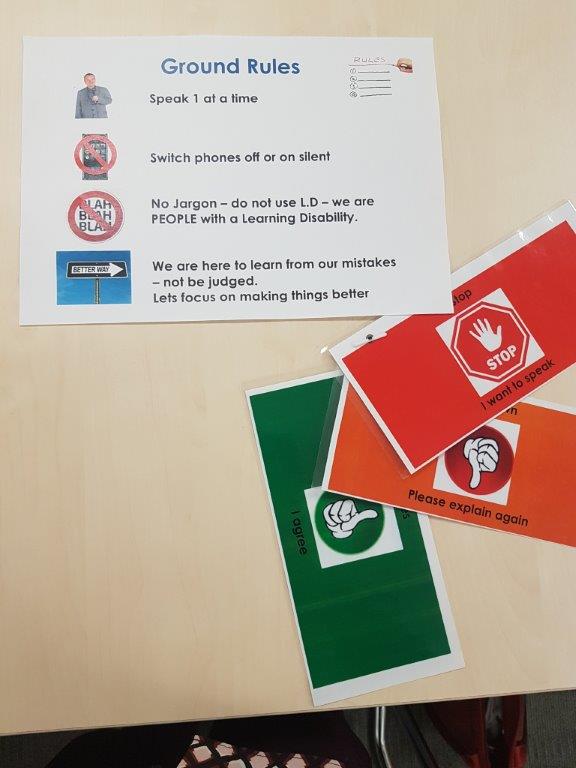
I WANT TO SPEAK
Thanks for this guest post from a parent who is concerned about the priorities for those making high-level decisions about funding around healthcare, and the impact this may have on families who need support in the age of austerity. She also raises important questions about the language we use; for example how does it feel to be called a ‘challenging family’ in the context of support that might be offered? Her central point is stark – the only fixed point in a shifting landscape of support provision is to see the families who need it as ‘incompetent’ and requiring ‘intervention’.
I had a strange day recently. I left work at lunchtime to attend a NHS Transforming Care meeting where transfer of funds ( ‘dowries’ ) from the NHS, accompanying people with learning disabilities transferred from secure accommodation to homes within the local community arranged by and paid for by local area Clinical Commissioning Groups, was discussed.
There were a number of ‘Experts by Experience’ present. One tabled a list of acronyms that he asked not be used during the meeting. This list included ‘spec. com’ (short for ‘Specialised Commissioning’). He also asked that those speaking refer to ‘people’ not ‘patients’. His request was assented to by all before the meeting started.
During the meeting as people around the table made presentations, a person from NHS Specialised Commissioning repeatedly referred to ‘spec. com’ and ‘patients’ throughout his presentation. The Transforming Care programme will succeed or fail in large part depending on whether funding follows people. If I understood the presentation correctly, it appears that except in very limited circumstances it won’t. It is hard to know how to react to this in the context of a meeting when none of the decision-makers are present.
It seems as though the impact of the Winterbourne View scandal is fading and there are new priorities for those making high-level funding decisions around healthcare. I know that for many local Clinical Commissioning Group commissioners charged with delivering the Transforming Care programme, who will have to compete for funding at a local level to deliver a programme that will incur considerable additional costs for local areas if delivered, it is very difficult to accept. For people with learning disabilities in long stay institutions (over five years) and for people whose cause of death can be listed as ‘Leaning Disability’ on their death certificate when they die of constipation it will be felt in ways, you and I cannot even begin to imagine.
What hope to deliver a programme for systemic change as complex as the Transforming Care one is, if professionals cannot even keep to rules they agreed to about the use of language that respects the wishes of those they hope to help?
It really was a strange day because I then went on to another meeting where the great and the good and the well-intentioned were listening to care experienced young people sharing their thoughts about the system they spent many of their childhood years within, some with no clear idea why or where their siblings that had been adopted, were.
Social workers also spoke about being asked to ‘do much more with much less’ and how it was impossible to deliver a service where everything from what services are provided by what agency to the social work workforce itself is in flux. Teachers also reported that they were now doing social work in schools, well beyond their capability and training. It was summed up as ‘Challenging Families were being passed between services without getting the early intervention they needed’.
The language of ‘casual disrespect’
I have to say this was a depressingly familiar story to me, so again I chose to reflect on language. Would anyone have thought it OK to refer to my family in a one-to-one conversation with me as a ‘challenging family’ needing ‘Intervention’ and if most would not, then why is it OK to refer families like mine, in this casually disrespectful way? Is it OK because parents of children in need of services are not meant to be listening into this intense conversation or is it that our opinions just do not matter or that we are not expected to have anything of value to contribute unlike the great and the good and the well-intentioned? Or is it that people are afraid of what we might say? Are we that much of a challenge and to whom and what exactly? The only fixed point in this shifting landscape of service provision seems to be to regard families in need of services as, at best, incompetent and in need of an ‘intervention’.
If I’ve understood correctly then what chance do families ( those groups of people – not systems – that in normal circumstances, nurture children and prepare them well for adulthood because of bonds of love ) have of ever being heard when asking for help, not intervention, when we ask for it for ourselves or our children and indeed what chance have the great and the good and the well-intentioned of improving the life chances of young people like my son, without respectful engagement with us, their family members?
